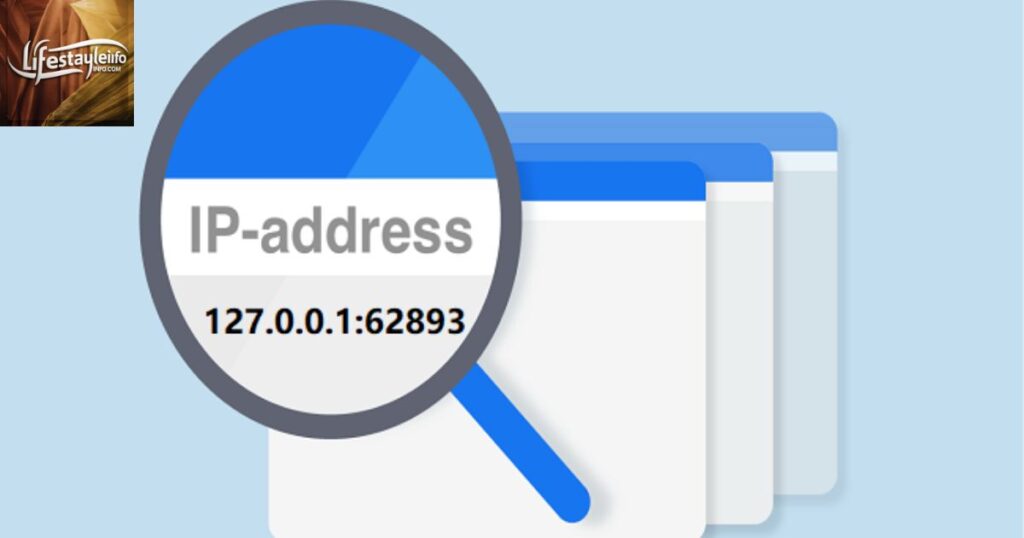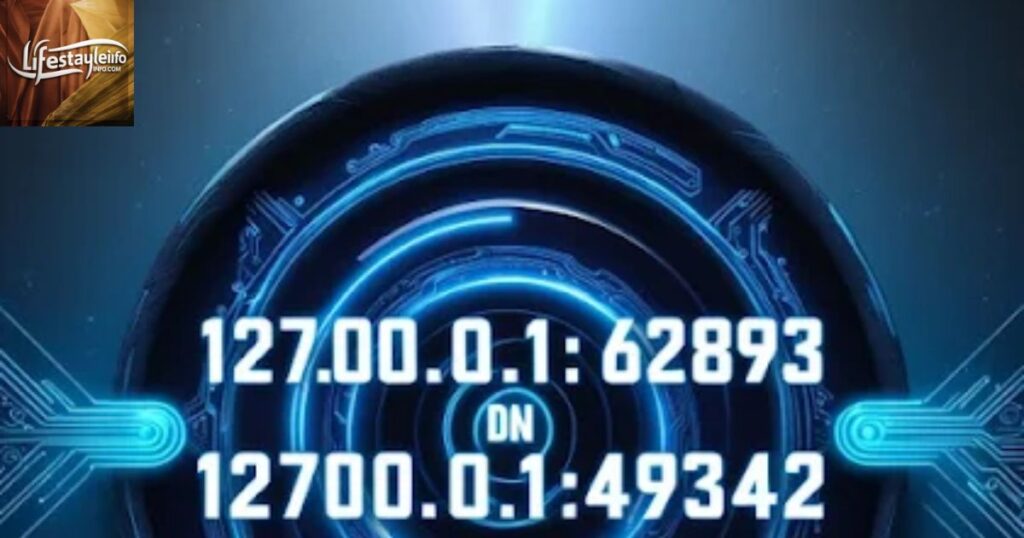Vast digital landscape of interconnected devices, the 127.0.0.1:62893 IP address stands as a unique identifier with special significance. This loopback address serves as a gateway to your local network, enabling seamless communication between programs and services within your own device.
The 127.0.0.1 portion of this address is well-known to developers and network administrators as the localhost address. It allows a device to send network communications to itself, creating a closed loop that’s invaluable for testing and debugging. The addition of :62893 typically represents a specific port number.
127.0.0.1:62893 IP address is essential for anyone delving into the world of networking, cybersecurity, or software development. It serves as a foundational concept, illustrating the principles of IP addressing while highlighting the importance of local network communication.
What is an IP Address?
An IP (Internet Protocol) address is a unique numerical identifier assigned to every device connected to a computer network. It serves as a virtual address, allowing devices to communicate and exchange data across the internet or local networks.
Much like a physical mailing address enables the delivery of letters and packages, an IP address ensures that data packets reach their intended destination in the vast digital landscape Without these addresses.
IP addresses come in two main versions: IPv4 and IPv6. IPv4 addresses are 32-bit numbers typically represented as four sets of numbers separated by dots (e.g., 192.168.0.1), while IPv6 addresses are 128-bit numbers represented in hexadecimal.
Understanding the Format of an IP Address

The most common IP address format is IPv4, which consists of four sets of numbers separated by periods, such as 192.168.0.1. Each set, called an octet, can range from 0 to 255, providing a total of approximately 4.3 billion unique addresses.
In this format, the first part of the address typically identifies the network, while the latter part identifies the specific device within that network. This hierarchical structure allows for efficient routing of data across the internet and within local networks.
With the exponential growth of internet-connected devices, IPv6 was introduced to expand the available address space. IPv6 addresses are represented as eight groups of four hexadecimal digits, separated by colons
Read More About: A Detailed Guide On Geekzilla Podcast – Everything You Should Know
The Importance of IP Addresses
IP addresses are fundamental to the functioning of the internet and all networked communications. They enable devices to send and receive data, access websites, use online services, and communicate with other devices across the globe.
In addition to facilitating basic internet connectivity, IP addresses play crucial roles in network security, geolocation services, and content delivery. They allow network administrators to monitor and control access to resources.
Furthermore, IP addresses are essential for troubleshooting network issues, configuring firewalls and routers, and implementing various network protocols. They form the backbone of how we interact with the digital world.
Types of 127.0.0.1:62893 IP Addresses

IP addresses are fundamental to network communication. They can be broadly categorized into several types, each serving specific purposes. Let’s explore these types and the unique role of 127.0.0.1:62893.
1. Public IP Addresses
- Description: Globally unique addresses assigned by Internet Service Providers (ISPs).
- Usage: Used for internet-facing devices and services.
- Characteristics: Visible to the entire internet, allowing global communication.
2. Private IP Addresses
- Description: Reserved for use within local networks.
- Usage: Assigned by routers or network administrators for internal communication.
- Characteristics: Not directly accessible from the internet, providing added security.
- Common ranges:
- 10.0.0.0 to 10.255.255.255
- 172.16.0.0 to 172.31.255.255
- 192.168.0.0 to 192.168.255.255
3. Loopback Addresses (127.0.0.1:62893)
- Description: Special addresses used to identify the local machine.
- Usage: Allows programs and services on a device to communicate with each other locally.
- Characteristics:
- Self-referential
- Not accessible from external networks
- Often represented as “localhost”
- The special case of 127.0.0.1:62893:
- 127.0.0.1 is the standard loopback address
- :62893 represents a specific port number
- This combination is likely used for a local service or application listening on port 62893
4. Link-Local Addresses
- Description: Automatically configured addresses for communication on a single network segment.
- Usage: Used when no DHCP server is available.
- Range: 169.254.0.0 to 169.254.255.255
5. Multicast Addresses
- Description: Used to send data to multiple destinations simultaneously.
- Usage: Efficient for distributing information to a group of interested receivers.
- Range: 224.0.0.0 to 239.255.255.255
6. Broadcast Addresses
- Description: Used to send data to all devices on a network.
- Usage: Network-wide communications, such as ARP requests.
- Example: 255.255.255.255 (limited broadcast address)
These different types of IP addresses are crucial for network management, troubleshooting, and maintaining security in networked environments.
Read More About: 127.0.0.1:62893 IP Address
How to Find Your IP Address

Finding your IP address is a common task that can be useful for various networking purposes. This guide will show you how to find both your private (local) and public IP addresses on different devices and operating systems.
Windows
Find Private IP Address:
- Press Windows key + R to open the Run dialog.
- Type cmd and press Enter to open Command Prompt.
- In the Command Prompt, type ipconfig and press Enter.
- Look for the “IPv4 Address” entry under your active network adapter.
Find Public IP Address:
- Open a web browser.
- Visit a website.
macOS
Find Private IP Address:
- Click the Apple menu and select “System Preferences.”
- Click on “Network.”
- Select your active network connection (e.g., Wi-Fi or Ethernet) 62893.
- Your IP address will be displayed in the status section.
Find Public IP Address:
Same as the Windows method using a web browser.
Linux
Find Private IP Address:
- Open Terminal.
- Type ip addr show and press Enter.
- Look for the “inet” entry under your active network interface (e.g., eth0 or wlan0).
Find Public IP Address:
- Open Terminal.
- Type curl ifconfig.me and press Enter.
Mobile Devices
iOS:
- Go to Settings > Wi-Fi.
- Tap the “i” icon next to your connected network.
- Your IP address will be listed under “IPv4 Address.”
Android:
- Go to Settings > Network & Internet > Wi-Fi.
- Tap on your connected network.
- Expand the Advanced section to find your IP address.
Public IP on Mobile:
Use a web browser to visit an IP checking website, as mentioned in the Windows section.
Using Command Line (for public IP):
On Windows, macOS, or Linux, you can use the following command in Terminal or Command Prompt 62893:
Read More About: A Detailed Guide On Geekzilla Podcast – Everything You Should Know
Common Uses and Misuses of IP Addresses

- Network Communication: Enabling devices to send and receive data over the internet or local networks.
- Device Identification: Uniquely identifying devices on a network for routing and access purposes.
- Geolocation: Approximating the physical location of devices (though not always accurate).
- Access Control: Restricting or allowing access to networks, services, or content based on IP addresses.
- Network Troubleshooting: Diagnosing and resolving connectivity issues.
- Load Balancing: Distributing network traffic across multiple servers to optimize performance.
- Content Delivery: Serving region-specific content or implementing content delivery networks (CDNs) 62893.
Misuses of IP Addresses
- IP Spoofing: Disguising the source of network traffic by forging IP address information.
- DDoS Attacks: Overwhelming target systems with traffic from multiple IP addresses.
- Unauthorized Access: Attempting to gain entry to systems or networks by exploiting IP-based vulnerabilities.
- Geoblocking Evasion: Circumventing geographic restrictions on content or services.
- Online Stalking: Using IP addresses to track or harass individuals online.
- Email Spam: Sending unsolicited bulk emails from multiple IP addresses to evade filters.
- Data Scraping: Automated collection of data from websites, often violating terms of service.
Security Risks Associated with IP Addresses
- IP Address Leaks: Exposure of real IP addresses when using VPNs or proxy services.
- Man-in-the-Middle Attacks: Intercepting communication between two parties by exploiting IP routing.
- IP Hijacking: Maliciously taking control of IP address ranges to redirect traffic.
- Port Scanning: Probing IP addresses for open ports to identify vulnerabilities.
- Brute Force Attacks: Attempting to guess passwords or encryption keys using multiple IP addresses.
- Phishing: Using seemingly legitimate IP addresses to trick users into revealing sensitive information.
- Targeted Attacks: Using IP information to launch specific attacks against individuals or organizations.
- Botnets: Networks of compromised devices with unique IP addresses used for malicious purposes.
- Session Hijacking: Stealing or predicting session tokens based on IP address information.
- IP Blacklisting: Legitimate IP addresses being wrongly blocked due to previous misuse.
Mitigation Strategies
- Use firewalls and intrusion detection systems.
- Implement strong authentication methods (e.g., two-factor authentication).
- Regularly update and patch systems and software.
- Use VPNs or proxy servers to mask real IP addresses when necessary.
- Implement IP address filtering and access control lists.
- Monitor network traffic for suspicious activity.
- Educate users about IP-related security risks and best practices.
- Use secure protocols (HTTPS, SFTP, etc.) 62893 for data transmission.
- Implement rate limiting to prevent abuse from single IP addresses.
- Regularly audit and update IP-based security policies.
These uses, misuses, and risks are crucial for maintaining a secure network environment and protecting against potential threats.
Final Words
IP addresses form the backbone of our interconnected digital world, serving as essential identifiers for devices on networks both local and global. From the widely used public and private IP addresses to the specialized loopback address 127.0.0.1:62893, each type plays a crucial role in facilitating communication, enhancing security, and enabling the smooth functioning of networks.
As we’ve explored, understanding IP addresses is vital for network administrators, developers, and even everyday users 62893. While they bring numerous benefits and uses, IP addresses also come with potential risks and misuses that require vigilance and proper security measures.
As the digital landscape continues to evolve, particularly with the transition to IPv6, the importance of IP addressing in networking, cybersecurity, and online interactions will only grow.
FAQ’S
What is 127.0.0.1:62893?
127.0.0.1 is the localhost address, allowing a device to communicate with itself. The :62893 portion likely represents a specific port number for a local service or application.
What are the main types of IP addresses?
The main types are public IP addresses (globally unique), private IP addresses (for local networks), loopback addresses, link-local addresses, multicast addresses, and broadcast addresses. Each serves a specific purpose in network communication.
How can I find my IP address on Windows?
To find your private IP, open Command Prompt and type “ipconfig” 62893. For your public IP, visit an IP checking website in a web browser.
What are some common misuses of IP addresses?
Common misuses include IP spoofing, DDoS attacks, unauthorized access attempts, and online stalking. These activities often exploit IP-based vulnerabilities or use IP information maliciously.
How can I protect myself from IP-related security risks?
Use firewalls, keep systems updated, implement strong authentication, and consider using VPNs. Educate yourself about IP-related risks and follow best practices for online security.

Lila Whittaker, creator of lifestyleinfo.com, shares wellness tips, trends, and advice to inspire balanced living. Loves nature, new recipes, and good books.










hy